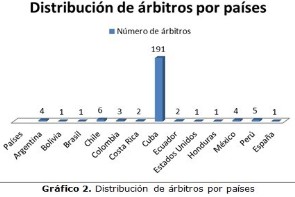Management of reviewers in the Archivo Médico de Camagüey journal
Abstract
Background: after the preliminary acceptance of the article from the methodological point of view, and the writing of the text, it is revised by experts, a process that is fundamental to validate its scientific validity.
Objective: to describe the experience and results of the journal Archivo Médico de Camagüey in the management of reviewers´ incorporation.
Methods: a search was made in the SciELO Cuba, SciELO Regional databases, the used descriptors were referee, peer review, selection criteria.
Results: the number of incorporated reviewers is increasing, with representation of the provinces of the country and from other countries, most of the provinces are represented and after Cuba with (86,0 %) they are followed by Chile (2,7 %) and Peru (2,2 %).
Conclusions: the management of reviewers is a complex and meticulous process, which is planned in three moments: identification, verification and negotiation. The magazine shows an ascending work in the incorporation of reviewers, the incorporation of referees from other countries of the region is increased.
DeCS: TRAINING PROGRAMS FOR SCIENCE EDITORS; SYSTEMS FOR EVALUATION OF PUBLICATIONS; PEER REVIEW, RESEARCH; JOURNAL IMPACT FACTOR; PUBLICATION BIAS.
Downloads
References
1.Institute of Physics Publishing. Peer review and the acceptance of new scientific ideas. Discussion paper from a Working Party on equipping the public with an understanding of peer review [Internet]. London: Published by Sense About Science; 2004 [citado 21 Jun 2015]. Disponible en: https://web.archive.org/web/20060623193431/http://www.senseaboutscience.org.uk/PDF/PeerReview.pdf
2.Batista Hernández NE. La publicación científica: Un reto necesario para los profesionales de la salud. Medicentro Electrónica [Internet]. Mar 2014 [citado 17 Jun 2015];18(1):[aprox. 3 p.]. Disponible en: http://scielo.sld.cu/scielo.php?script=sci_arttext&pid=S1029-30432014000100001&lng=es
3.Alfonso Manzanet JE, Silva Ayçaguer LC. Gestión automatizada en el proceso editorial de una revista científica como demanda inaplazable para favorecer la cultura comunicacional. Educ Med Super [Internet]. Mar 2014 [citado 21 Jun 2015];28(1):[aprox. 9 p.]. Disponible en: http://scielo.sld.cu/scielo.php?script=sci_arttext&pid=S0864-21412014000100015&lng=es
4.Manual de normas y procedimientos. La Habana: Editorial Ciencias Médicas; 2012.
5.Day RA. Cómo escribir y publicar trabajos científicos. 4th ed. Washington DC: Oryx Press; 1996.
6.Mari Mutt JA. Manual de Redacción Científica [Internet]. Mayaguez: Departamento de Biología, Universidad de Puerto Rico; 1999 [citado 22 Ago 2018]. Disponible en: https://www.uco.es/servicios/informatica/windows/filemgr/download/ecolog/Cuaderno%20redaccion%20trabajo%20cc.pdf
7.Bosch X, Alfonso F, Bermejo J. ¿Por qué se ha rechazado nuestro artículo? Rev Esp Cardiol. 2002;55(7):782-3.
8.Moreno Ceja F, Cortés Vera JJ, Zumaya Leal MR. Usos, limitaciones y prospectiva de la evaluación por pares. Rev Interam Bibliot [Internet]. 2012 [citado 28 Mar 2018]; 35(2):[aprox. 10 p.]. Disponible en: http://www.scielo.org.co/pdf/rib/v35n2/v35n2a07.pdf
9.Monteagudo Canto A. El arbitraje: un proceso poco comprendido. AMC [Internet]. Jun 2013 [citado 2018 Ago 22];17(3):[aprox. 4 p.]. Disponible en: http://scielo.sld.cu/scielo.php?script=sci_arttext&pid=S1025-02552013000300001&lng=es
10.Silva Ayçaguer LC. El arbitraje de las revistas médicas, la gestión editorial en red y la calidad de la publicación científica. Rev Cubana Salud Pública [Internet]. 2012 [citado 28 Mar 2018];38(1):[aprox. 3 p.]. Disponible en: http://scieloprueba.sld.cu/scielo.php?script=sci_arttext&pid=S0864-34662012000100001&lng=es
11.Fernández Morín J. Importancia del arbitraje de las revistas médicas para la calidad de la publicación científica. Rev. Med. Electrón [Internet]. Feb 2012 [citado 28 Mar 2018];34(1):[aprox. 2 p.]. Disponible en: http://scieloprueba.sld.cu/scielo.php?script=sci_arttext&pid=S1684-18242012000100011&lng=es
12.Galbán Rodríguez E. La revisión editorial por pares: rechazo del manuscrito, deficiencias del proceso de revisión, sistemas para su gestión y uso como indicador científico. Rev Cubana Inform Ciencias Salud [Internet]. 2013 [citado 28 Mar 2018]; 24(3);[aprox. 16 p.]. Disponible en: http://scielo.sld.cu/scielo.php?script=sci_arttext&pid=S2307-21132013000300008&lng=es

Published
How to Cite
Issue
Section
License
Copyright (c) 2018 Boris Gustavo Suárez Sori

This work is licensed under a Creative Commons Attribution-NonCommercial 4.0 International License.
Copyright: Camagüey Medical Archive Magazine, offers immediately after being indexed in the SciELO Project; Open access to the full text of the articles under the principle of making available and free the research to promote the exchange of global knowledge and contribute to a greater extension, publication, evaluation and extensive use of the articles that can be used without purpose As long as reference is made to the primary source.
Conflicts of interest: authors must declare in a mandatory manner the presence or not of conflicts of interest in relation to the investigation presented.
(Download Statement of potential conflicts of interest)
The Revista Archivo Médico de Camagüey is under a License Creative Commons Attribution-Noncommercial-No Derivative Works 4.0 International (CC BY 4.0).
This license allows others to distribute, to mix, to adjust and to build from its work, even for commercial purposes, as long as it is recognized the authorship of the original creation. This is the most helpful license offered. Recommended for maximum dissemination and use of licensed materials. The full license can be found at: https://creativecommons.org/licenses/












 22 julio 2025
22 julio 2025